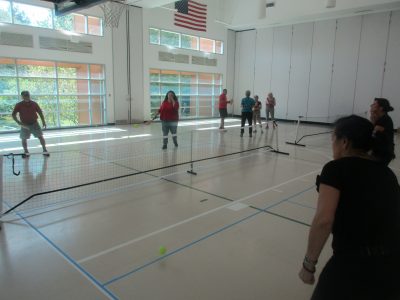Full Programming for Isolated Senior Citizens Can’t Return Soon Enough
After the pandemic forced senior centers and programs throughout the county to close or drastically limit their offerings, most are trying to slowly return to normal.
During the past year the most pressing concern has been for older seniors living alone who, without social interaction, have been at risk for depression and despondency.
“It was important to keep in contact with our seniors who were isolated,” said Laurie Gonzalez, director of the Office of Elder Americans in Mount Pleasant. “We delivered meals three times a week to those experiencing social isolation. A meal was left at the doorway by someone who would knock on the door, step away at a safe distance, and when the door opened, there would be a nice face to say hello to.”

Gonzalez said its nutrition program served about 125 Mount Pleasant seniors, delivering over 22,000 meals over the past year. The program provided not only a meal but a person to chat with for a few minutes.
“For some, the in-person encounter was the highlight of their day and they would dress up to look their best,” she said.
The town’s Nutrition Program is scheduled to return in-person on Sept. 8 for all those 60 and over at the Community Center in Valhalla on Mondays, Wednesdays and Fridays. There is no date for the Tuesday and Thursday lunch program to return at the Bradhurst Center in Hawthorne.
Some centers have been slower to return to in-person programming. At Pleasantville’s Clinton Street Senior Center, older residents recently voiced frustration to the Village Board that services have remained shuttered or limited since last year. The primary concern was for seniors in their 80s and 90s who are struggling with being alone.
“They’re the ones who have suffered with nothing to do,” said Sylvia Nomikof, a Clinton Street resident. “They are getting depressed and frustrated because they have no place to go. They don’t drive and depend on the center.”
Nomikof was among a group of Pleasantville seniors who voiced their concern about the lack of transportation for grocery shopping, few social events and reduced indoor dining at the July 12 Village Board meeting. The popular lunch hours have been replaced with boxed meals that are picked up between 11:30 a.m. and 12:30 p.m. Monday through Friday.
“We are looking to reopen meals in-house by mid-August, depending on staff schedules,” said Joni Ehrlich, director of senior services at the Clinton Street Center. “Seniors will be offered one meal a week in the building. We will gradually build up to offering more.”
Shopping trips have been slow to resume, Ehrlich acknowledged, because their small bus makes it difficult to adhere to COVID guidelines for social distancing from the Centers for Disease Control. Another challenge is finding an experienced part-time driver after the last driver retired.
Ehrlich said the center initially set up programs last June through Zoom and the local access cable station PCTV. In-person programs were run outside, where participants could be socially distanced easily.
“That way we made sure we were seeing the ones that were most vulnerable,” Ehrlich said.
Isolation was also a concern for Christine Grey, assistant superintendent for New Castle’s Recreation & Parks Department.
“People did suffer because we kept the center closed,” Grey said of senior programs at the center in Chappaqua. “Our social worker reached out to our seniors and offered a discussion group twice a week on how to come out of isolation. She’s always in touch with the seniors.”
Grey said at the height of the pandemic, they received several calls from children of elderly parents concerned about the absence of programs. Grey increased the number of meals to be delivered on a daily basis to with those living alone. She also said community volunteers checked in on the housebound to keep them connected.
As more seniors got vaccinated and COVID cases declined, in-person programs have slowly increased. Depending on staff availability and space, shopping and theater trips are being planned and centers are offering board games and exercise classes. Most are limited and require reservations, masks and social distancing.
“We are so intent on keeping our seniors safe and make sure the environment is safe,” said Liz Dieter, recreation supervisor for senior citizens in Mount Kisco. “We are going slowly and listening to the science.”
The Clinton Street Center plans on offering bingo after lunch in August, adding another dining day in September and in-person classes in October.
In Mount Pleasant, trips to casinos have resumed, along with senior games and exercise classes. Mount Kisco’s Fox Senior Center is offering tai chi, line dancing, crafts, bridge and bingo. New Castle is holding regular exercise and craft classes.
With COVID numbers increasing, providing safe environments for seniors remains the big challenge for those in charge. They are cautiously moving ahead.
Ehrlich is concerned that many retired people still take care of grandchildren who are too young to get vaccinated.
“Older caregivers are getting kids off the bus in the summer or after school,” she said. “With the Delta variant looming, there are constantly moving parts while we are managing to keep seniors and staff safe.”

Abby is a seasoned journalist who has been covering news and feature stories in the region for decades. Since The Examiner’s launch in 2007, she has reported extensively on a broad range of community issues. Read more from Abby’s editor-author bio here. Read Abbys’s archived work here: https://www.theexaminernews.com/author/ab-lub2019/
